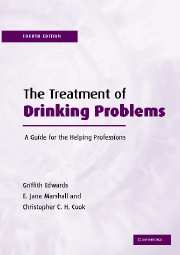Book contents
- Frontmatter
- Contents
- A note on the fourth edition
- Acknowledgements
- Introduction
- Part I Background to understanding
- Part II Screening, assessment and treatment
- 14 Case identification and screening
- 15 Assessment as the beginning of therapy
- 16 Withdrawal states and treatment of withdrawal
- 17 The basic work of treatment
- 18 Alcoholics Anonymous
- 19 Special techniques
- 20 Working towards normal drinking
- 21 When things go wrong, and putting them right
- 22 Treatment settings, professional roles and the organization of treatment services
- Author index
- Subject index
- References
18 - Alcoholics Anonymous
Published online by Cambridge University Press: 11 August 2009
- Frontmatter
- Contents
- A note on the fourth edition
- Acknowledgements
- Introduction
- Part I Background to understanding
- Part II Screening, assessment and treatment
- 14 Case identification and screening
- 15 Assessment as the beginning of therapy
- 16 Withdrawal states and treatment of withdrawal
- 17 The basic work of treatment
- 18 Alcoholics Anonymous
- 19 Special techniques
- 20 Working towards normal drinking
- 21 When things go wrong, and putting them right
- 22 Treatment settings, professional roles and the organization of treatment services
- Author index
- Subject index
- References
Summary
Alcoholics Anonymous (AA) was founded in the USA in 1935 by two alcoholics (Wilson, 1994). Its growth since then has been dramatic. There are now more than 51 000 groups and over 1.1 million members in the USA alone, and there are more than 100 000 groups in total in almost 170 countries worldwide. The estimated world membership is over 2 million. AA first began to establish itself in the UK in the late 1940s and there are now 3000 groups in Great Britain.
AA has helped countless individuals (often when professional intervention has failed), is a repository of astonishing experience and subtle and often humorous wisdom, and has had a profound influence in humanizing social attitudes towards people with drinking problems. It is thus an enormous potential resource, and it is a dereliction of duty if patients go through treatment without AA ever being mentioned or, worse still, if they are deflected from AA involvement by some negative statement born of ignorance and misunderstanding – ‘I think you would find it all too religious.’
The therapist must be willing to find out how AA operates and what its beliefs are, and the best way of doing so is to pay a personal visit to an open meeting of AA – a meeting open to all-comers, as opposed to closed meetings which are restricted to AA membership.
AA meetings
The AA meeting is of central importance to AA's functioning.
Information
- Type
- Chapter
- Information
- The Treatment of Drinking ProblemsA Guide for the Helping Professions, pp. 300 - 312Publisher: Cambridge University PressPrint publication year: 2003
